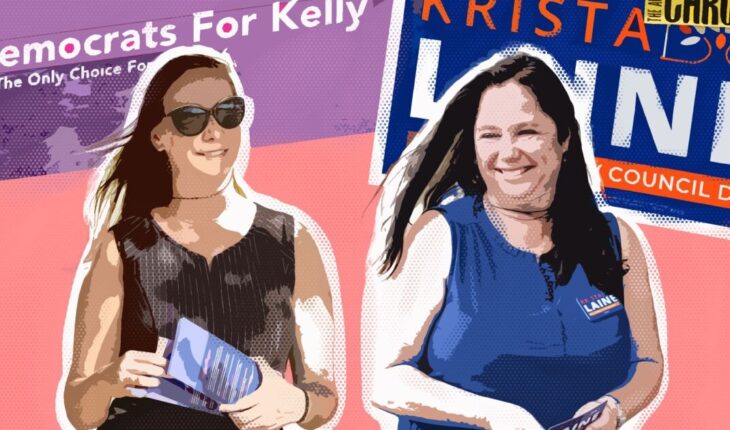For Democrats running for office in Texas, David Butts has long been the go-to guy.
He’s worked on the campaigns of now-U.S. Congressman Lloyd Doggett, former Texas Gov. Ann Richards and Austin Mayor Kirk Watson. In an Austin-American Statesman story about Butts’ career from 2014, he is termed the “Obi-Wan Kenobi” of Austin politics and a “liberal warlord.”
But now Butts has turned his support, this time personal instead of professional, to a conservative candidate. He and about two dozen longtime Democrats have thrown their clout and money behind a Republican seeking reelection to the Austin City Council. They’re calling themselves “Democrats for Mackenzie Kelly.”
While council races are nonpartisan, Kelly is a bonafide conservative on a liberal body. As the representative for the city’s northernmost district, she’s often the lone objector in a sea of yeses. That’s especially true when the vote is on an issue such as abortion, transgender health care or financial assistance programs.
But when it comes to land use and housing, Kelly has found backing among some Austin liberals. In the last year, the council has attempted to bring down housing prices by voting to let property owners build more on smaller pieces of land.
The move has been controversial and polarizing. Kelly and a second council member have been the only “no” votes.
“If she were running for state representative, I probably wouldn’t support her,” Butts, who is upset with the recent council votes on land use changes, said. “But she’s running for the City Council, where the biggest issue the city deals with is land use.”
Housing produces strange bedfellows. The alliance formed with Democrats for Kelly illustrates how fights over the rules governing what can be built and where do not fall neatly along traditional party lines. And how for some, local elections have become about a single issue.
Votes on the land development code
In mid-May, dozens of people showed up to Austin City Hall. One person carried a sign that read, “Mayor Watson, Don’t SELL OUT Austin!!!” while others cheered on elected officials.
Council members were set to amend long-standing land code rules. These rules dictate anything from how far back from a property line a house can sit to how tall a building can be. They determine what the city looks like, how residents get around and how close to neighbors and businesses people can live.
Michael Minasi
/
KUT News
In an attempt to curb the rising cost of housing, elected officials decided they would make a simple but contentious move. They would change rules to make more land available for homes and encourage people to build smaller houses, such as duplexes and townhomes.
The hope was that smaller homes would sell or rent for less and that more housing would bring down prices overall. Supporters pointed to research that suggests building more homes quells or even brings down costs. It’s a phenomenon that has already played out in Austin; after a boom in apartment construction, rents have been falling for more than a year.
Elected officials had been here before. For nearly a decade, the council worked to overhaul its land code.
But in 2019, homeowners concerned about these changes successfully sued to halt the process. They were able to do this, in part, because the council didn’t have a supermajority, or nine of 11 members, in support.
That changed in 2022. Voters replaced council members skeptical of land code changes with those ready to vote in favor. The council, now led by Watson, had near-unanimous support for amending Austin’s land rules.
This led to the meeting back in May. The council had voted months earlier to let property owners build up to three homes where historically they could only build one or two. They called this policy HOME Phase 1. Now, they were poised to go further and planned to drastically reduce the amount of land needed to build one home, lowering it from 5,750 square feet to 1,800. They called this HOME Phase 2.
Michael Minasi
/
KUT News
Testimony went late into the night, with residents testifying for more than 12 hours. The makeup of those signed up to speak was skewed a bit more towards those against the item, although hundreds still signed up in favor.
These sides are often whittled down to NIMBYs (“Not in my backyard”), or people who say they support more housing as long as it’s not in their neighborhoods, versus YIMBYs (“Yes in my backyard”) who say building more homes, and lots of them, is part of the solution to rising prices. Another group in this fight includes anti-gentrification activists, who worry encouraging more homes could hypercharge displacement.
Democrats for Kelly members said they reject the term NIMBY to describe them.
When council members reconvened the next morning to vote, they moved swiftly: nine for, two against.
Kelly and Council Member Alison Alter, who represents parts of West Austin, were the lone “no” votes. Kelly opposed the new policy, she said, for several reasons: the effect it could have on the environment, property tax bills and a negligent impact on the high cost of housing.
An environmental consultant and longtime participant in local politics, Robin Rather had spoken against similar policies. She called the council’s decision in May “reckless” and noted Kelly’s opposition.
“I’m not exactly sure why she voted against it,” said Rather, who has signed onto Democrats for Kelly. “But at least she voted against it.”
Forming ‘Democrats for Kelly’
Democrats for Kelly acknowledge they’re supporting a candidate who doesn’t share many of their liberal values.
In 2022, Kelly was the only council member to vote against a $350 million affordable housing bond. As part of budget discussions this summer, she suggested cutting city offices dedicated to equity and sustainability, arguing staff should already be incorporating these objectives into their everyday work.
Kelly has also opposed ordinances on state and national issues, places where local government has limited power.
In May, Kelly was the lone “no” vote on an ordinance barring city staff from investigating doctors who may have violated Texas law by providing gender-affirming care to minors. A few months later, she voted against spending $400,000 to help women seek abortions out of state. The state later sued the city over both votes.
“It’s surprising she has any Democrats’ support,” former Mayor Steve Adler said.
But land use and housing are galvanizing issues. A home determines where someone lives and dictates the length of their commute, what schools their kids can access, what grocery stores they can easily get to. It’s also one of the best ways to build wealth in this country.
Renee Dominguez
/
KUT News
“I don’t know the specifics on any of the items she voted against,” said Allan McMurtry, a longtime Austin resident who has signed onto the Democrats for Kelly campaign. “But it’s not enough for me to say, ‘I’m not gonna sign on and support her.’”
“She’s not an ideal candidate,” Rather added.
Yet members of Democrats for Kelly have donated thousands of dollars to a political action committee supporting the candidate and others. It’s money worth spending, they say, to ensure she remains opposed to land code changes, which they worry will negatively impact the value of their homes, the environment and the character of their neighborhoods.
“Most people buy homes because they want to live in them,” Butts said. “They’re not exactly thrilled at the idea of having tall buildings plopped down next to their house.”
The group has also cast Kelly as an environmentalist. Democrats for Kelly includes several old guard environmentalists, many of whom are credited for keeping Barton Springs Pool swimmable thanks to a battle they waged over development in the early 1990s.
They note how Kelly recently allocated $150,000 from her office’s budget to develop a park in her district. She also voted to adopt a plan to manage land near sensitive water sources.
“I didn’t go into council thinking I was a good environmentalist,” Kelly said. “But I do think there are places where I align with [them].”
Other environmentalists say Kelly’s record is mixed, at best. In 2021, she was the only vote against adopting a citywide climate plan, which established a goal of reaching net-zero carbon emissions by 2040. She cast the lone vote in August against creating a committee to look into asking voters to help pay for climate change mitigation.
“I can’t think of, off the top of my head, any initiative she’s taken on that is pro-environment,” said Luke Metzger, executive director of Environment Texas.
Democrats’ support for Kelly is not just to keep her on the council, but to ensure her opponent, Krista Laine, stays off.
Laine has positioned herself as the Democrat in the race. Before she co-founded a political action committee to advocate for school board candidates, Laine worked as a real estate analyst and appraiser. She said if she had been on the council in the past year, she would have voted “yes” on land code changes.
Michael Minasi
/
KUT News
“We have already seen what happens in this city if we keep things as they are,” Laine said, citing displacement and rising housing costs.
Laine maintains her real estate background could be an advantage on the council. She says she’s familiar with Austin’s permitting process and wants to help cut down on wait times and fees, long-held pain points for builders.
But members of Democrats for Kelly have characterized Laine as beholden to developers because of her background and support she’s received in her campaign.
The Real Estate Council of Austin (RECA) and the Home Builders Association of Greater Austin have both endorsed her. RECA’s political action committee listed Laine as a candidate it supports, although it was not clear how much money the committee had spent on her behalf.
But Kelly has also received financial support from the real estate industry. According to campaign finance reports, she received about $10,000 — or about 4% of her total individual donations — from people working for Endeavor Real Estate Group. The developer most recently sought council approval to redevelop the former Austin American-Statesman offices along the shores of Lady Bird Lake.
The future of council votes on housing
On a sunny Thursday evening, voters trickled into a polling station in Northwest Austin. It was Halloween. One voter wore a skeleton T-shirt, another dressed as Dorothy from “The Wizard of Oz.”
KUT News spoke with half a dozen voters, all of whom said they felt poorly informed about local races. When asked what issues they cared about most, they ticked off issues over which the Austin City Council has limited power: reproductive healthcare, LGBTQ rights.
Cat Calantonio, a nurse, said she was worried about police response times. She said she recently had to call 911 and was surprised at how long it took police to arrive.
Policing has been one of Kelly’s biggest focuses while on council. A former volunteer firefighter, she has been outspoken about increasing funding and staffing at the city’s police department. She joined a majority of her colleagues in passing a five-year, $218 million budget for the department last month.
But on Thursday, Calantonio didn’t vote for Kelly. Outside the polling station she grabbed a list of Democratic nominees from a volunteer. On it, Laine was identified as the Democrat in the local council race and so Calantonio voted the way of her party.
Many of the Democrats for Kelly do not live in Kelly’s district, District 6. But they say their support of the conservative candidate is part of a larger strategy to turn the council away from so-called YIMBY ideology and toward a governing body that isn’t so quick to sign off on land use changes.
“I have no doubt this kind of ‘YIMBY council’ will get overturned over the next few election cycles,” Rather said.
Renee Dominguez
/
KUT News
Kelly’s record of opposition is resounding. Since the start of 2023, she has voted “no” 165 times on council items. The council member who comes closest to meeting that record, Alison Alter, has voted against items 31 times. The remaining members barely hit the double digits for “no” votes.
Democrats for Kelly argues Kelly’s objections are worth more when it comes to land use. Her lone “no” cannot stop the council from funding a guaranteed income program or declaring reproductive rights human rights. Even if there were five Kellys on the council, these items would likely still have the support to go ahead.
But because of a quirk of state law, three “no” votes against land use and zoning changes opens the council up to legal challenges. It’s what allowed homeowners to sue the city in 2019. If they can secure two more “no” votes, they and other property owners may be able to stifle future changes.
Above all, members of Democrats for Kelly say she listens. They say other elected officials aren’t willing to give mind to their questions about and objections to land rule changes. For people who long held political sway in the city, it’s been disconcerting.
“[We] might as well be talking to a potted plant,” Butts said.
But Council Member José ‘Chito’ Vela, who won his seat in 2022, sees it differently.
Vela represents parts of Northeast Austin and voted in support of the recent land code changes. He is vying for reelection this year and has consistently run on a platform of building more and different kinds of housing.
“We hear their testimony. We read their emails,” said Vela, who won nearly 60% of the vote when he was first elected. “It’s not that we’re not listening. It’s that we’re not choosing the policies that they want.”
Support for KUT’s reporting on housing news comes from the Austin Community Foundation. Sponsors do not influence KUT’s editorial decisions.





